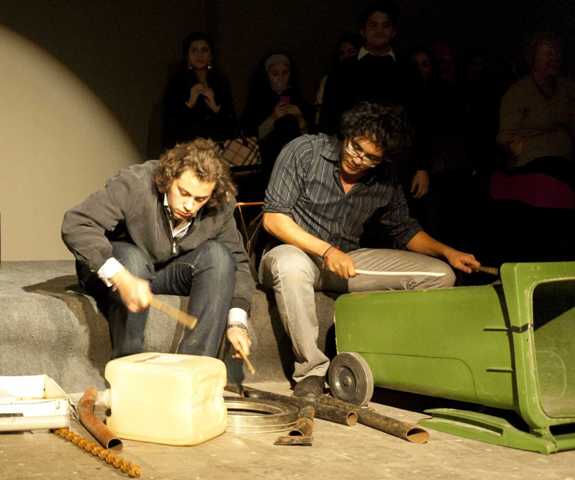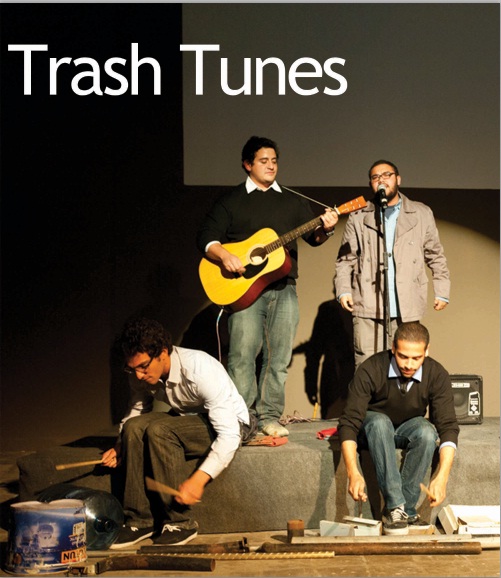|
|
Top: Aly Morad, Ahmed
Safi El Din; bottom:
Youssef Salah, Shahir
Eskandar, Naeyr Osama
and Noor Ayman '10 |
The Zabaleen Band, founded by AUC students, uses garbage to entertain its audience and call for social change
It is a long held adage that beauty is in the eye of
the beholder. Indeed, over the past year, a group of
AUC students and fresh graduates, known as
the Zabaleen Band, have latched onto this idea,
playing and composing music with an
approach that could only be described as
non-traditional, using trash as instruments.
Even before the January 25th revolution, the
group used their music to heighten people's
awareness about important social issues.
The Zabaleen Band, which is named after
garbage collectors in Egypt, was first formed
during AUC Earth Week more than a year
ago. The band is composed of four drummers,
a guitarist, saxophonist and vocalist. Like the
zabaleen [garbage collectors], who are known to
reuse a lot of what they collect, the Zabaleen Band
constructs its instruments out of found items. Since
their first performance, the band has been set to change youth's seemingly apathetic
attitude toward their country and
garner interest in environmental
activism through lyrics that focus on
issues such as pollution, education and
climate change. After the revolution,
the band's task has become easier.
"It has always been our goal to
increase people's passion for their
country through music, but before the
revolution, it seemed as though a lot
were apathetic," said Noor Ayman '10,
a member of the band. "Clearly, the
January 25th revolution changed all
that, and seeing Egyptians come out to
clean the streets was a moment we had
all dreamed of."
Aly Morad, another band member,
recalled the band's first performance. "We played a song titled Pick Up Your
Garbage, and people in the audience
really got into it," he said. "After the
show was over, one of the audience
members saw someone about to
throw some trash on the ground.
Instead of letting go, he turned to him
and repeated our lyrics. … It was
amazing to see a similar scenario
in Tahrir."
One of the best changes since the
revolution, Ayman noted, is the new
era of creativity. "No one asks for
permits on the streets anymore," he
said. "It's a great time to be an artist
because people have become more
expressive, both artistically and
politically."Taking advantage of the
relaxed permit regulations, the band
has begun putting on spontaneous
performances throughout Cairo's
streets. "We'd just decide to meet
somewhere and bring a few
instruments," Ayman said. "It's
something that would not have
happened before."
On the other hand, the postrevolutionary
atmosphere of creativity,
nationalism and newly found freedom
has led to the emergence of new
politically minded musical groups. "It
used to be just us and a few others,
but we're glad people are engaged," said Ayman.
Performing in both English and
Arabic, the Zabaleen Band members
play on anything they think will make
a good sound. "We use bottles for
drums and play on a load of stuff like
pipes and shakers made from cans with
rice inside," said percussionist Youssef
Salah, founder of the band.
In addition to recent street shows,
the band has performed at AUC
several times, as well as Al Azhar Park
and Project Yourself, an open mic
night in Cairo. "One of our favorite
songs," said Salah, "is themed on
enjoying the moment. It talks about
how some people are not happy with
what they have. It's a way to cheer up
our audience through music."
For band members, the group is also a way to stay connected. "All of us have become great friends; it is a camaraderie," said Ahmed Safi El Din, who is studying psychology and international marketing at AUC. "The band is a great way for us to connect as friends and turn our love of music into a great cause."

Photo by Ahmad El-Nemr
By Madeline Welsh
